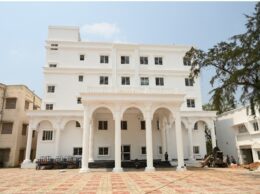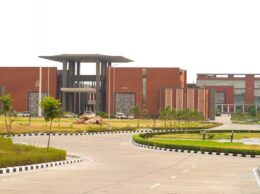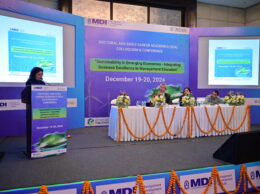IIHMR University organized a webinar on ‘Public Health Actions for Universal Health Coverage in Developing Countries.’ This webinar was organized under the aegis of SD Gupta School of Public Health (SDG-SPH). Dr. Ashok Agarwal, Trustee Secretary of IIHMR, Dr. Ferozuddin Feroz, Former Health Minister of the Islamic Republic of Afghanistan, Dr. Indu Bhushan, IAS, Former Chief Executive Officer (CEO) of Ayushman Bharat, Dr. SD Gupta, Chairperson, Dr. PR Sodani, President, IIHMR University, were the Panelists. Dr. D. K. Mangal, Professor, and Dean (Research), Advisor, SD Gupta School of Public Health, IIHMR University moderated the session. The webinar focused on the importance of health coverage and the challenges of overcoming the need for basic access to quality health services the world over in developing countries.
Dr. Ashok Agarwal, Trustee Secretary of IIHMR said, “SD Gupta School of Public Health (SDG-SPH) has been launched to felicitate the contribution of Dr. SD Gupta to the universe of Public Health. The SDG-SPH has been launched with a vision to train public health leaders, address knowledge on pressing health challenges and enhance population health and well-being. SDG-SPH is dedicated the improvement of health and well-being globally by preparing students to become public health leaders, scholars and practitioners.”
Dr. Ferozuddin Feroz, Former Health Minister of the Islamic Republic of Afghanistan, said, “More than 50% of the population world over does not have access to essential, quality & affordable health services. Over 930 million people, or 12% of the world’s population, spend at least 10% of the household budgets to pay for healthcare (WHO 2019). UHC contributes to achieving the objectives of other SDGs. UHC focuses on Promotion, Prevention, Treatment, and Rehabilitation. Universal coverage does not mean free coverage for all health interventions regardless of the cost; it is about embracing health systems, health service delivery, health workforce, health facility, communication networks, quality assurance mechanisms as well as governance. Universal Health Coverage cannot be improved unless equity is achieved.”
Universal Health Coverage should be designed based on scientific criteria, the country’s disease burden, cost-effectiveness studies, and health technology assessments.
Dr. Indu Bhushan, IAS, Former Chief Executive Officer (CEO) of Ayushman Bharat, said, “From 2000s India has made considerable progress on health indicators. Infant Mortality rate has declined by 51%, Maternal Mortality Rate has declined by 61%, and the number of seats for MBBS has tripled which we see an increase to 242% i.e number of MBBS seats has increased from 25058 in 2006 to 85726 in 2020. We have also seen an increase in public health expenditure by 80% and life expectancy has increased by 9%.”
Dr. Indu Bhushan further added, “The objective of the National Health Policy of 2017 has been guiding the UHC to achieve its targets. The response to COVID-19 Pandemic has strengthened the response to healthcare where we see rapid infrastructure up-gradation, policy reforms, and increase in healthcare awareness campaigns, augmenting infectious disease surveillance program, adoption of digital innovative solutions, improvement in hygiene standards, push for undertaking more research, deepening global cooperation on health and capacity building of health workers.”
Major National Health Policy targets for 2025 have been an increase in life expectancy to 70, reduce neo-natal mortality to a single digit, decrease household facing catastrophic expenditure by 25%, reduce premature mortality from NCDs by 25%, increase health expenditure by Government as a percentage of GDP to 2.5% and establish integrated health information architecture. For achieving the ambitious targets of UHC, India needs to counter several challenges such as fragmented and siloed health delivery, limited availability of human resources, inadequate healthcare infrastructure, asymmetry and deficit in access to health information, affordability of healthcare, and non-standardized quality of healthcare.
Dr. SD Gupta, Chairman, IIHMR University said, “SDG-SPH has been established to develop an institution that focuses on not mastering theories but transmitting these theories in practice. The institution shall be exploring new areas in public health and shall emerge as a thought leader.”
Dr. DK Mangal, Professor, and Dean (Research), Advisor, SD Gupta School of Public Health, IIHMR University moderated the session stated, “Universal health coverage is about ensuring that people have access to healthcare without suffering financial hardships. It is the key to ending achieving the twin objective of ending extreme poverty and increasing equity and shared prosperity. Goal 3 and target 3.8 aim at achieving universal health coverage and includes financial protection and access to quality essential healthcare services and affordable medicines and vaccines for all. About 90 million people are impoverished by health expenses every year. However, Universal Health coverage has gained momentum.”









